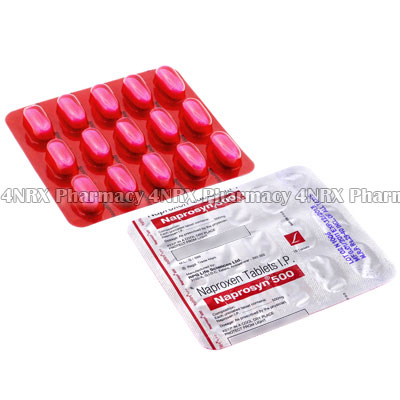 |
Home  Pain Pain  Naprosyn (Naproxen) Naprosyn (Naproxen) |
|
|||||||||
|
|
Naprosyn (Naproxen)
What is Naprosyn (Naproxen) used for? Naprosyn (Naproxen) is an oral non-steroidal anti-inflammatory drug (NSAID) prescribed to treat patients suffering from inflammatory conditions such as osteoarthritis, rheumatoid arthritis, acute gout, severe menstrual pain, or lower back pain. The medication blocks the actions of enzymes in the body that cause pain and swelling associated with these conditions to improve comfort and joint flexibility. Your doctor may also prescribe it for the treatment of other unlisted conditions. How should I use Naprosyn (Naproxen)? Naprosyn (Naproxen) should be used strictly according to your doctor`s instructions to get the safest and most effective results from treatment. One tablet is normally administered daily, but your particular directions will depend on your weight, age, health, the condition being treated, and the severity of your symptoms. These should be swallowed with a large glass of water and may be taken with or without food, but a snack or meal is recommended prior to use if you get an upset stomach. Do not split or crush the tablets prior to use as this may destroy or alter the effects of their contents. Ask your doctor or pharmacist any questions you have about the medicine to ensure the correct usage. What are the side effects of Naprosyn (Naproxen)? Naprosyn (Naproxen) may cause side effects in some patients such as:
Serious side effects that may require emergency medical attention include severe headaches, fever, flu symptoms, unusual weight gain, chest pain, difficulty breathing, sensitive skin, easier bruising, urinary retention, vomiting up a substance resembling coffee grounds, darkened urine, discoloured stools, jaundice, or a severe skin rash. Tell your doctor as soon as you experience any serious side effects that are worrying to you to make sure any necessary adjustments are made to your application frequency or dosage to stop further health problems from occurring. Please Note Naprosyn (Naproxen) should not be used to treat patients who are allergic to NSAID medications, who have had a bad reaction to similar treatments, or those who have severe heart failure, an active peptic ulcer, or active bleeding in the digestive system. Also inform your doctor if you have heart failure, hypertension, inflammatory bowel disease, diabetes, a history of asthma, a history of allergies, connective tissue diseases, peripheral arterial disease, cerebrovascular disease, ischaemic heart disease, high cholesterol, decreased kidney function, or decreased liver function. These conditions may cause unexpected problems during treatment requiring adjustments to your regimen. Strictly use Naprosyn (Naproxen) as prescribed and follow all instructions provided by your doctor. Safe, suitable, and optimum dosage can vary and is dependent on the patient`s health and medical history, as well as the condition you are treating. Naprosyn (Naproxen) may not be safe or suitable for all patients. Always ensure your doctor is informed if you are pregnant or breastfeeding, using any other type of medication (including non-prescription medicine, vitamins, and supplements), as well as if you have any allergies, other illnesses, or pre-existing medication conditions. Seek immediate medical attention or proceed to your nearest accident and emergency department if you suffer a hypersensitive or allergic reaction. Symptoms usually present during a reaction of this nature include difficulty breathing or swallowing, swelling of the limbs or face, tight chest, hives, and skin rashes. 

|
||||||||||||||||||